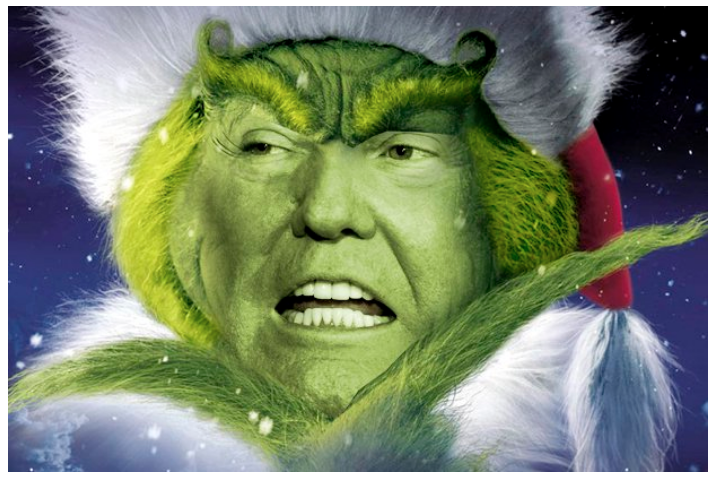The Grinch Comes to Omaha
 Courtesy of Joshua M Brown
Courtesy of Joshua M Brown
Since the S&P 500 topped on September 21, Berkshire Hathaway may have seen something on the order of over $30 billion in stock market drawdowns. It’s a startling number, even off of a large base of invested capital. According to Jim Sloan, writing at Seeking Alpha, the Berkshire portfolio’s losses from Apple alone could be as much as $19 billion over the last two months…
It’s obvious that the Berkshire Hathaway (BRK.B) portfolio of publicly traded stocks has taken a hit along with everything else in the recent downturn. Because of the large positions in Apple (AAPL) and large banks, the hit taken by Berkshire since the end of the 3rd quarter probably exceeds in percentage terms that of the market as a whole. An examination of the unrealized loss in value of several of Berkshire’s largest holdings through Friday, September 21, suggests the scale of the decline in portfolio value:
- Apple (AAPL) – roughly $19 billion
- Bank of America (BAC) – roughly $5 billion
- American Express (AXP) – a bit over $2 billion
- Kraft Heinz (KHC) – a bit under $3 billion
- U.S. Bancorp (USB) – a bit over a half billion
- Wells Fargo (WFC)- about $4 billion
That’s more than $33 billion in a portfolio valued at $177 billion at the end of the third quarter and doesn’t include the rest of the portfolio which is smaller and probably declined at a bit lower rate. More than half the damage came from Apple alone.
Josh here. Of course, those numbers are close but not perfect, because we only have holdings data as of the latest 13G filings, which are generated at the end of each quarter and come out 45 days later. But if it’s even in the ballpark, these numbers are enormous.
I wrote The First Casualty of a Bear Market back in 2014 and told the story of how Buffett’s company had “lost” $6.2 billion in a single six week period during the late summer of 1998 – during the Russian ruble crisis that culminated with the Long Term Capital meltdown and subsequent bailout.
Taking a page out of Nick Murray’s book (literally), I got into the reason for Buffett’s spectacular long-term success in the investment markets: Personality…
Warren Buffett didn’t change his plans or blast a great big hole in his portfolio that summer. He did not turn temporary declines into permanent losses. Instead, he stuck to his investment strategy while so many others lost their grip.
Buffett didn’t have any information about the future then just as we don’t today. But what he did have, according to Murray and all of his biographers, was an incredibly even-keeled temperament. It is Buffett’s temperament and not his analytical skill that allows him to ride out episodes like this. But more than that, it is Buffett’s ability to distinguish between volatility and risk.
We’ll find out eventually how Buffett, Munger and investment lieutenants Ted and Todd have spent the last few weeks. We’ll see what they bought and what they paid. More Apple 36% in the hole? Perhaps. They may have even begun executing their own buyback of Berkshire itself. We shall see.
But thinking about how Buffett is currently acting – despite massive drawdown numbers that are so large they may even threaten the prospects of any book value growth for 2018– is among the best things we can can consider at times like these.
It is unlikely that Warren Buffett is lashing out at people on Twitter, screaming at the Federal Reserve, throwing beer cans at his television or checking his phone every fifteen minutes for a refreshed quote.
It is more likely that he is finding a way to use his $100 billion-plus cash hoard to take advantage, despite how much he’s down on paper. This is what separates the best who ever did it from everyone else.



